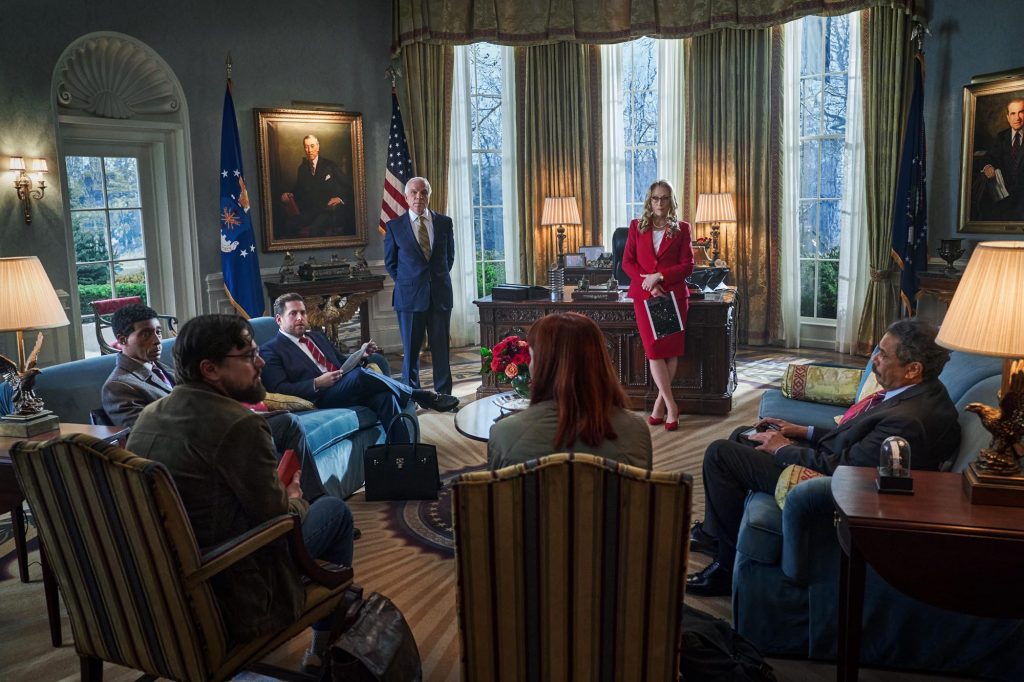Warning: This review contains spoilers.
Everyone seems to have a take on Don’t Look Up. We’ve already published one from another Left Voice writer. Here’s another one.
Don’t Look Up is the story of a pair of astronomers, Kate Dibiasky and Randall Mindy (Jennifer Lawrence and Leonardo DiCaprio) who try (and fail) to warn the world of a “planet-killer” comet due to hit Earth in mere months. Calling his film “the most thinly-guised metaphor in the history of metaphors,” director Adam McKay (director of Vice and The Big Short) makes it very clear in an interview with Esquire that it is an allegory for the climate crisis (and can easily apply to the other global crises, such as the pandemic) and its perpetuation despite the endless warnings of scientists and other experts.
The movie gets a lot right, and gives appropriate urgency to the climate crisis. But the comet metaphor has its limits, and may distort implications for what action should look like. The action we take now may mean the difference between reversing the disaster that’s already underway and a slow-burn apocalypse.
What Don’t Look Up Gets Right
The massive popularity of Don’t Look Up is a testament to its dead-on characterization of our current moment.
The film satirizes some of the most unsavory and chilling personalities in the U.S. oligarchy. While Dibiasky (after whom the killer comet is named) is turned into a meme and effectively driven out of public life, Mindy becomes a Fauci-esque figure who decides to work within the system, compelled to make moral and scientific concessions at every turn.
Meryl Streep plays the president of the United States, a combination of the ruling-class political entrenchment of Joe Biden with the populism of Donald Trump, who ignores the apocalyptic news until it’s politically advantageous to act upon it, passing a huge spending bill to send nuclear weapon-equipped space drones to divert the comet. The plan is aborted moments after launch when creepy tech CEO Peter Isherwell (played by Mark Rylance) — a mashup of Jeff Bezos, Elon Musk, Mark Zuckerberg, and Tim Cook — discovers that the comet contains $30 trillion worth of precious metals needed to manufacture his company’s mobile devices.
Much like the real-life Silicon Valley billionaires, Isherwell casts himself as a savior touting tech solutions to global crises while pursuing advantage for the few at the expense of the many (and ultimately, at the expense of all). His exploitative projects are meant to evoke real-life schemes of so-called asteroid trillionaires, such as the space-mining company Planetary Resources backed by Google’s Larry Page.
In the film, Isherwell has the president wrapped around his finger, clearly showing how politicians are owned and whipped by their donors. After Isherwell obstructs the original plan, the federal government proceeds to partner with him on a project to blast and mine the comet, at great risk to all of humankind.
In this way, the movie does a great job of mocking the most sinister expressions of capitalist futurism dreamed up by billionaires. The oligarchs are unfazed by the extinction threat, as viewers discover they have been prepared for a doomsday scenario; in humankind’s final moments, they steal away in a rocket with room for only 2,000 people, who will be cryogenically preserved as they are carried to a Planet B thousands of light years away. Part of the brilliance of the movie is the way it specifically targets the ruling class and its refusal to take action — all the practical solutions are in sight, but the politicians won’t act on them. In the movie, it seems this inaction is based on sheer stupidity, shortsightedness, hunger for power, and profit myopia. In reality, to act would run counter to the only thing that drives their decisions: the quest for greater and greater profit. To act would be to undermine the system based on profit and exploitation from which they derive their power.
Don’t Look Up has certainly gotten mixed reviews. Some have deemed it unfunny, poorly written, or too obvious (a claim to which Ezra Brain has already insightfully replied). Other critics have called out the movie for smugly targeting our society’s “easiest” vices, such as our shallow fixation on celebrity culture, and missing the “real” problems. These critics believe that political polarization would be a sharper object of the film’s critique, shortsightedly suggesting that politicians’ failure to work across the aisle is the primary obstacle standing between humanity and meaningful climate action. But this view fails to acknowledge that Democrats, for all their climate promises, are equally invested in protecting the economic system that stopping climate change threatens.
If the superficial influencers, iniquitous plutocrats, and incompetent leaders might tempt a cynical viewer to perceive the human race as a species not worth preserving, the film counteracts this pessimism with its quiet, earnest, zoomed-out shots of Earth and all its living wonders — of which ordinary working people are a part. Through these moments, McKay reminds us that humanity is more than its profiteering scumbags.
Why the Climate Crisis isn’t a Comet
There are indeed oversimplifications in the movie, and while I disagree that they take away from its message, they do complicate clean comparisons to our current reality. While the comet metaphor is undoubtedly a powerful characterization of the threat posed by the climate crisis, it distorts the crisis’ relationship to the capitalist system and perhaps understates the action needed to “divert” it.
To examine this, it’s important to think about the movie’s intended impact, both on- and off-screen.
We are in a moment of widespread “climate despair” — the feeling of being overwhelmed and immobilized by anxiety over climate change as a fundamentally unstoppable force — and that any change is too little, too late. While some discount these feelings as overly dramatic or counterproductive, they’re not entirely unfounded. We’re not just at risk of many of the threats that scientists warn of — many have already occurred, and are irreversible, as the Intergovernmental Panel on Climate Change (IPCC) report released this summer soberly spelled out. Indigenous land and culture have already been obliterated and are at ever-greater risk. Island nations are in danger of being wiped out by rising sea levels. Catastrophic climate disasters are now commonplace. Moreover, we are on a course for much worse in the absence of immediate action.
As one of my comrades said in a conversation about the film, “Some of this climate despair is the result of not believing that change is possible. But there is also despair that flows from realism — from knowing the changes that are needed, and understanding realistically that time doesn’t wait for us to position ourselves to bring that change to pass, because it requires a revolution.”
It is in this context of insufficient time that McKay released Don’t Look Up. It isn’t just intended to be a movie — it’s also an awareness campaign meant to parallel the #JustLookUp social media campaign depicted in the film. The creators paired with Count Us In, a project whose mission is to “inspire 1 billion citizens to significantly reduce their carbon pollution and challenge leaders to deliver bold, global change.” The campaign is clearly meant to spark awareness, action, and hope in the midst of this despondency. Clicking around on the official site, one is prompted to take “practical action on climate change,” with suggestions ranging from calling your politicians to eating more veggies.
I commend McKay and Sirota in drawing attention to the climate crisis. And we, as the audience of this film, have to see these individual calls to action as necessary, but far from sufficient.
By putting so much emphasis on individual responsibility, the creators are diverting attention from the fact that climate change cannot be stopped, and certainly not reversed, by individual actions. Overstating individualism can have a depoliticizing effect, encouraging people to focus inward rather than building solidarity and taking to the streets to catalyze the revolutionary change that is really needed.
That being said, I don’t think the movie is about indicting individuals; it actually elucidates how capitalists can create or worsen problems, then manipulate the public to convince people not to “look up.” Working people are not at fault for buying into it — we just have drastically different resources to fight for our interests. But at the point we have reached in barreling toward disaster, focusing on individual action can blind us to the need for solidarity and mass mobilization.
To further analyze the comet metaphor, Don’t Look Up presents a crisis that is capable of being solved through swift, executive action. While the audience does not get to see whether the original divert-the-comet plan would have panned out, we are expected to accept the premise that the solution to the impending apocalypse is basically within the reach of the existing U.S. government — it’s just a matter of listening to the scientists, unlocking the funding, and deploying the nuclear weapons with enough urgency.
Unlike an unforeseen comet hurtling toward us from the depths of space, climate change is a prolonged issue rooted in and exacerbated by the capitalist mode of production. Bourgeois politicians are not just unable to address it — it is against their material interests to do so.
The climate crisis is perpetuated because of capitalist governments like the United States, not in spite of them. The United States is the “superpower” that it is because of capitalism and imperialism, which requires ongoing environmental exploitation and degradation to sustain itself. Its economic power is predicated on exploitation and coercive trade that depletes its own and the world’s natural resources. Its “influence” is flanked by a massive military, which pollutes more than 100 countries combined. By implying that the solution is in the hands of the United States is an oxymoron; if politicians were to act in a way that would truly reverse the climate crisis, it could no longer be the United States.
This is why there is no perfect legislation or magic spending number that will unlock climate solutions, and why we can’t make comparisons between the Green New Deal and the movie’s original plan to divert the comet. As Jasper Bernes puts it, “We cannot legislate and spend our way out of catastrophic global warming.”
For all the facile disagreement among bourgeois politicians that we see on Twitter, none of them challenge the basic premise that capitalism is the root of the climate emergency. Even progressives think that we can reform capitalism or change it from within. This belief is reflected in the movie, which seems to say that if only the ruling class had its priorities straight, if only the right people were in office, we could all be saved.
In the tweet below, McKay implies that capitalist solutions are waiting for us; it’s just a matter of garnering public awareness and political will. But our oligarchic governments are not just unwilling to handle the most pressing global disasters —to reverse the climate crisis would be at odds with the fundamental factor that drives their decisions and gives them power: profit.
Does that mean we shouldn’t apply the pressure? Should we collapse into nihilism? Not at all. We have to fight for reforms that improve the lives of working people wherever we can, and it’s unspeakably urgent. We have to make revolutionary demands, even though we know our bourgeois governments will never actually implement anything even close to our fullest program. The more we demand and the louder we do it, the more they have to concede.
But these concessions — these necessary but insufficient reforms — are not going to happen by calling our representatives in Congress. They are going to happen by terrifying them with our collective power, by taking the streets and fighting.
The problem with overstating the comparison with the climate crisis to a comet, as the film’s creators have done, is that it distracts us from the radical (read: practical, realistic) course of action that is truly needed. But Don’t Look Up should not fuel our bitterness or complacency or reignite our hope in getting the right people in office — it should fuel our rage at the ruling class and its institutions.
As the countless reactions, hot takes, and conversation sparked by Don’t Look Up have shown, there is no one way to interpret this movie. Some think it’s nihilistic, others galvanizing. As the audience, our interpretation is not separate from, but part of the art itself. Clearly, this is what McKay and the stars of the film intended. We, the working class, the front lines of global disasters created and perpetuated by capitalism, have the opportunity and the responsibility to interpret this film as a call to action — to reignite the climate movement, organize mass working-class mobilizations, and fight for the future of humanity.











